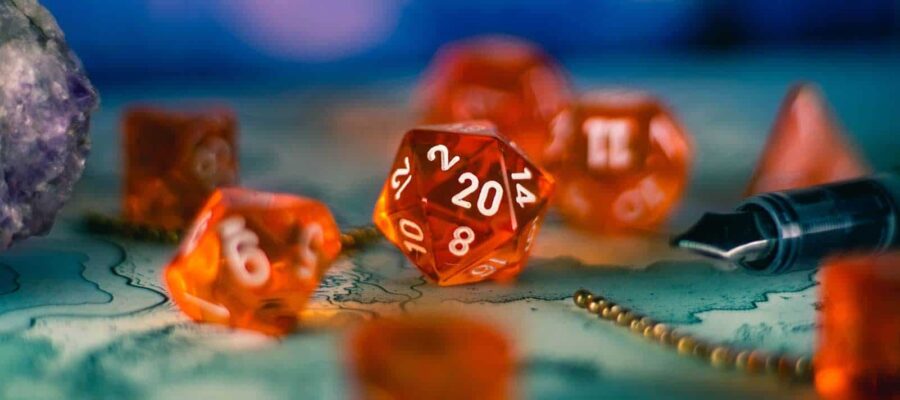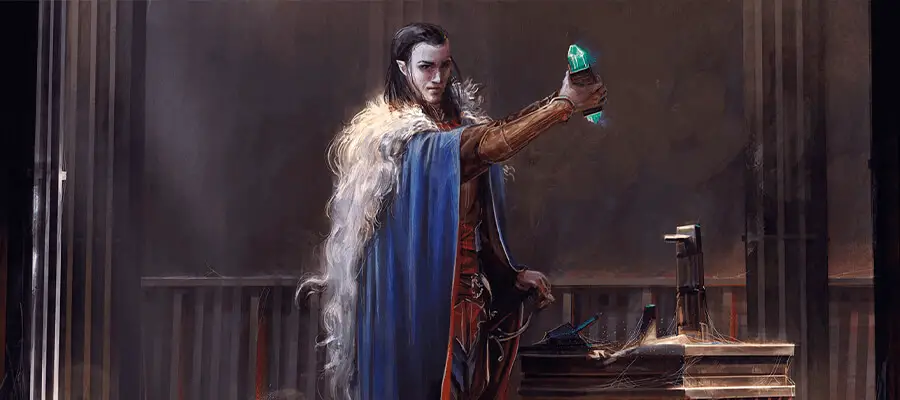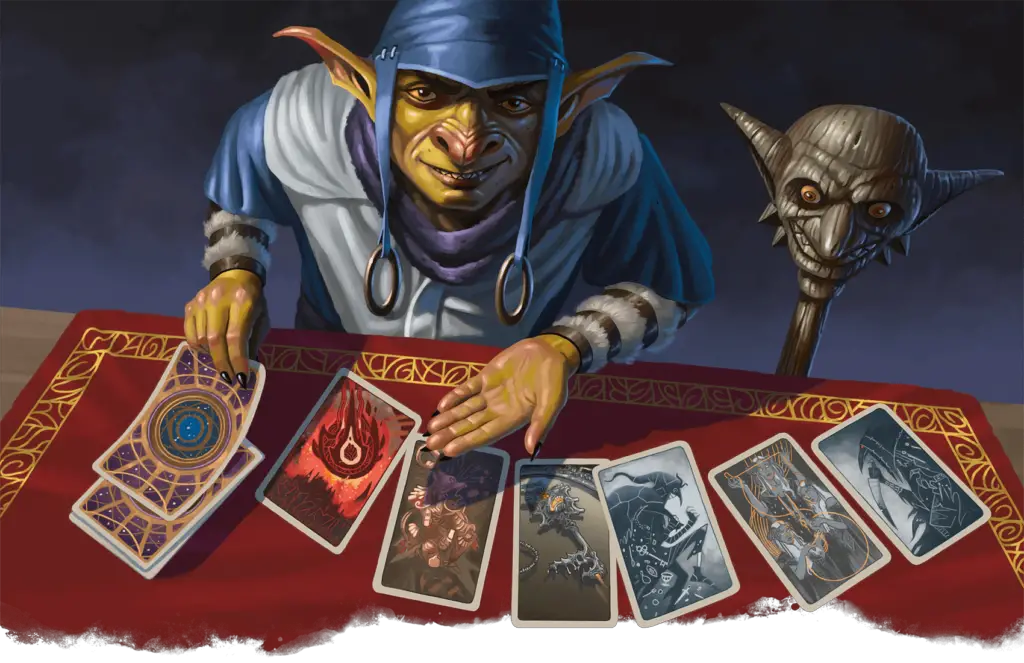Dispel Magic featured art is dice photography by the talented Timothy Miller.
Disclaimer: This article contains affiliate links that add gold to our coffers.
Dispel Magic is an iconic D&D spell. It provides ubiquitous benefits, and I realized this week that I had been misinterpreting what the spell does. I venture to guess that I’m not alone in my misinterpretations, especially after browsing forums discussing Dispel Magic. I will clear up many misconceptions, but you’ll probably find yourself debating with yourself about how you would resolve Dispel Magic in strange circumstances. In this article, I’ll answer more questions than I create.
The Breakdown
I’ll begin with a breakdown of the Dispel Magic spell based on its description in the Player’s Handbook:
“Choose one creature, object, or magical effect within range.”
Creature: I don’t think this requires further explanation. Comment if I’m wrong!
Object: While describing rules for destroying objects, the DMG p.246 describes an ‘object’ like this: “discrete, inanimate item like a window, door, sword, book, table, chair, or stone, not a building or a vehicle that is composed of many other objects.” I doubt players and game masters would allow Dispel Magic to target entire buildings and settlements. You can assume an ‘object’ is anything that can be worn or carried. You could reasonably target parts of a building, such as a wall, but not an entire structure. However, the DMG goes on to describe different sizes of objects, including Huge objects, so use your judgment.
Players may argue that they may target anything with size that is contained within the 120-foot range of Dispel Magic. I think that’s a stretch. The term ‘object’ is used in seemingly plain English rather than as a hard rule definition. Pay attention to the context and intent when you read about a rule that involves objects.
Magical Effect: This is the ambiguous targeting option that gets D&D fans talking. What is a magical effect? Since Dispel Magic can only end spells according to the 2019 Sage Advice Compendium, the magical effect must be caused by a spell. A Fog Cloud spell can be dispelled with Dispel Magic, but fog created by a monster’s presence cannot be dispelled. The fact that Dispel Magic only works against spells creates opportunities for other spells to relieve specific magical effects. Lesser Restoration, Greater Restoration, and Remove Curse remain useful in their tailored circumstances.
Within Range: It’s easy to miss, but this targeting does not specify that you must have visibility of the magical effect that you target. Many spells specify that you must choose a target you can see, but Dispel Magic doesn’t have that limitation. Keeping that in mind, you must have a method of perceiving the creature, object, or magical effect that you target. Dispel Magic does not have an area of effect. Choosing to target ‘all invisibility effects within 120 feet’ won’t work. Targeting an invisible creature if you know its location will end all spells affecting the creature.
You can also target a discrete magical effect that is affecting a creature or object without dispelling other spells affecting the creature. Depending on game-master interpretation, you may need to abide by the target rules for spells on PHB p.204. If so, you’ll need a clear path to the target. This obviously becomes circumstantial, so just embrace the ambiguity and work through unique circumstances with your dungeon master.
“Any spell of 3rd level or lower on the target ends.”
It can end multiple spells affecting the target. I think this is the source of much confusion. Remember that you will choose one target and potentially end all spells (plural) affecting that target (singular). It’s unclear whether it ends a spell entirely or merely cleanses the target creature. I don’t have an answer for this. The spell’s description is ambiguous between the two interpretations. I haven’t found official clarifications (or even unofficial clarifications) on the topic. I would rule that it ends the spell on the target only.
“For each spell of 4th level or higher on the target, make an ability check using your spellcasting ability. The DC equals 10 + the spell’s level. On a successful check, the spell ends.”
You can end multiple spells at once! Be ready to roll for each one unless your spell slot was high enough to automatically succeed.
“When you cast this spell using a spell slot of 4th level or higher, you automatically end the effects of a spell on the target if the spell’s level is equal to or less than the level of the spell slot you used.”
Basically, if you upcast Dispel Magic, you change the spell levels mentioned in points two and three above. The spells that are dispelled without an ability check are of the upcast spell level. Spells that require skill checks are of a higher level than the spell slot you used to cast Dispel Magic. For example, dispelling a fourth-level spell would require an ability check if Dispel Magic is cast at third level. That same Fire Shield would be dispelled without an ability check if Dispel Magic is cast at fourth level.
FAQ
Q: Would Dispel Magic end a spell the target concentrates on if the Dispel Magic caster targets a creature to remove all spells affecting that creature? In other words, can you target a creature that is concentrating on a spell to end the concentration spell, removing the spell’s effect from all affected creatures?
A: I haven’t found a definite answer on this, but I’m confident in this interpretation: concentrating on a spell is not the same as being affected by it or having a spell ‘on’ the concentrator. If a target Wizard concentrates on a Haste spell cast on another creature (let’s say a Fighter), the Haste spell does not end due to Dispel Magic being cast on the Wizard. The Haste spell is not ‘on’ the Wizard.
Q: Can a spellcaster target an effect like the Bless spell that affects several creatures, ending the Bless spell on all creatures affected by it? What if not all creatures under the effect of Bless are within Dispel Magic’s range?
A: The Sage Advice compendium from April 2020 specifies that Dispel Magic can’t dispel the Bless spell from all creatures that Bless is buffing, only allowing the Bless spell to be dispelled from one target at a time. Since there are other spells like Cloudkill or Fog Cloud that are not latching on to creatures as magical effects, I interpret that those types of spells can be dispelled entirely. (Answer updated 5/9/2020)
Q: Can Dispel Magic cause a magical item to become mundane? Can Dispel Magic undo Druid Wild Shape transformations? Can Dispel Magic undo Channel Divinity magical effects? What about Arcane Ward?
A: (Answer applies to all these questions) No, Dispel Magic can only dispel magical effects created by a spell. These examples are not spells.
Q: Will an instantaneous effect be undone by Dispel Magic, such as healing?
A: No, Dispel Magic cannot undo instantaneous effects. Instantaneous effects use magic, but after the spell is cast, they are not sustained by magic. An interesting example is Animate Dead, an instantaneous spell to create an undead creature. That undead creature cannot be destroyed by Dispel Magic or even Antimagic Field. On the other hand, Conjure Woodland Beings is not an instantaneous spell; thus, it can be dispelled, but only one creature at a time (not all creatures summoned by the spell at once).
Q: Can Greater Invisibility be dispelled by Dispel Magic if the dispelling caster can’t see the invisible target?
A: As long as you know where the invisible creature is, you can dispel Greater Invisibility. This is because Dispel Magic’s description does not specify a visibility requirement as most spells have. However, you must still be able to target the creature since Dispel Magic is not an AOE spell. Invisibility does automatically grant the benefits of being hidden.
Q: Can permanent magical effects be dispelled?
A: Yes, if they are created by spells that do not have ‘instantaneous’ duration. Some spells specifically are not affected by Dispel Magic; those effects will be immune. Permanent versions of Major Image or Teleportation Circle can be dispelled, for example. It would be a severe downer to work for so long to create these permanents to have some chump stroll up and dispel them. There are exceptions; Wall of Stone’s permanent version is specifically described as unable to be dispelled in the spell’s description. You may find other exceptions for permanent effects if their predicated spells have instantaneous duration.
Q: When a creature is targeted by Dispel Magic, and that creature is within a persistent AOE spell (like Cloudkill or Fog Cloud), will Dispel Magic dispel the AOE effect?
A: No, Dispel Magic targeting the creature will only end spells directly affecting the target creature, spell effects that are merely happening around the creature.
Q: Can Dispel Magic end a ritual casting of a spell before it completes?
A: No, the spell isn’t affecting anything yet. You’d be better off with other methods to interrupt the ritual.
Q: Can Dispel Magic end a spell that has been readied with the Ready action?
A: No, the spell isn’t affecting anything yet.
Q: Will Dispel Magic function like Counterspell if you Ready it to dispel a spell being cast?
A: No, spellcasters can use Dispel Magic only on effects that are already taking effect.
Q: Can you dispel a magic effect you can’t perceive? For example, target a creature that is invisible or target the invisibility effect itself.
A: As I mentioned earlier, Dispel Magic does not specify that you must see your target. However, targeting a spell typically requires a line of sight and a clear path as per the PHB section on spellcasting. Having said that, your DM will likely require you to know the target, such as the location of an invisible, unseen creature. I recommend reading the discussion in this question’s link to form your own opinion, as well as this additional forum discussion. Remember that you can’t target general invisibility in an area, but you can attempt to dispel Invisibility from a single creature.
Q: If you want to dispel a debuff from your ally without also dispelling a buff, how can that be done?
A: You can only do this if you can target a discrete spell effect. If you want to dispel a spell from a creature, you must not target the creature itself, attempting instead to end one discrete magical effect (spell) affecting one creature. The spell you’re targeting only ends on one creature or object it is affecting. If you target the creature, all spells of a level below your level of Dispel Magic will be automatically dispelled, while higher levels will require rolls. This is confirmed by Jeremy Crawford. I know this can be unclear because you’re not technically targeting a creature or object; you’re targeting a magical effect affecting a given creature or object.
Tactics Involving Dispel Magic
Several spells seem to be worth preparing or choosing 90% of the time, and Dispel Magic is one of them. Dispel Magic can turn the tides of battle as it swings the action economy in your favor. Enemy turns are entirely undone with your own action. The best-case scenario is when you dispel multiple spells simultaneously, but even a one-for-one trade of spell slots can be worth it.
Consider whether a spell threatening your party is dependent on concentration. If so, your party may be able to break the concentration and end the spell before it can lay waste to your party. Dispel Magic may still be preferred for breaking concentration spells, depending on the situation and the threat posed by the spell.
Non-concentration spells are prime targets for Dispel Magic; these spells might be powerful buffs like Fire Shield, Invulnerability, or Foresight. If you’re the gambling type, cast Dispel Magic at third level and roll to attempt removal of powerful spells, but I recommend upcasting Dispel Magic to make sure you succeed. This is especially true of targets that have multiple spells affecting them because you can dispel them all.
Dispel Magic has an impressive range and is one of the most readily available spells for many spellcasting classes (sorry, Rangers). Maintain a distance of at least 65 feet when you cast Dispel Magic to avoid Counterspell ruining your spell.
Attempting to dispel an effect that cannot be dispelled is a common gaffe. Ask your DM if they’d allow dispelling of instantaneous spell effects like a stone door sealed by the Stone Shape spell or an animated skeleton to be reduced to a pile of bones. DM’s should appreciate this question ahead of time because it will help them be consistent with their rulings. Remember, you can’t dispel magical effects that aren’t based on spells unless your DM has chosen to expand Dispel Magic’s utility beyond rules as written. Arm yourself with meta knowledge when you start packing this spell, and you’ll do just fine.
Spellcasters that don’t invest in their spellcasting ability should upcast Dispel Magic to ensure it succeeds. They don’t want to gamble for success. Spellcasters that typically invest heavily in their spellcasting ability score, such as Wizards, will have a greater chance of succeeding on a roll to succeed with Dispel Magic. The best casters for Dispel Magic are Bards (any kind) and Abjuration Wizards because they both possess class features that grant additional bonuses to ability checks like Dispel Magic. Wizards have an additional advantage with likely Arcana proficiency. A Wizard can reliably use Arcana skill checks to identify a spell effect and its level; this is valuable knowledge when deciding what level to cast Dispel Magic.
Parties that often surprise enemies with stealthy ambushes and high initiative rolls will have fewer reasons to cast Dispel Magic because they probably slay magical enemies before they become threats. This is an example of a party that might benefit from other spells without Dispel magic.
Dispel Magic: Conclusion
As one of the top spells in the game, each player would do well to meditate on the uses and limitations of Dispel Magic. Many classes can cast it, so it seems that Wizards of the Coast designed the game with Dispel Magic as a boon for players to deal with deadly magic spells. Monsters and enemy NPCs can cast it too, but the ubiquitous nature of the spell could be anti-fun if used in excess. DMs, do not overuse Dispel Magic. When everyone can cast Dispel Magic, the figurative dispel economy becomes ravaged by inflation.
Spellcasters should not always feel pressured to prepare or learn Dispel Magic. Players should never feel compelled to choose a single spell due to its ubiquity and strength. I say this because players should not shame a spellcaster for not having it at a clutch moment. The DM will probably have more fun anyway.
I highly recommend finding some way to have a contingency Dispel Magic available, whether from a magic item like a wand or some other method. A party with Dispel Magic is prepared for 90% of magical encounters, but they can deal with magical effects in multiple ways. Communication is the most powerful spell of all, so make sure you discuss tactics and contingencies with your party.
Overall, the game wouldn’t be the same without Dispel Magic, so give this spell the respect it deserves! Thank you, Dispel Magic, for all you’ve done for us. And “stuff you!” for ruining our fun the rest of the time!
Let me know if I missed anything!
If you want to explore spells further to expand your knowledge, you can find a growing number of spell analysis articles here. I have an article that I’ll be updating irregularly with ideas to improve unpopular spells here.
And these are some of my favorite spells that I’ve analyzed:
And Opal has compiled spell lists of recommended spells for various classes:
- Ranger spells
- Underutilized Druid spells: levels 1-3, 4-6, and 7-9
- Warlock spells (and invocations)
Happy adventuring to you!





Interesting article, but wanted to add some clarity.
“Object: I doubt players and game masters would allow Dispel Magic to target entire buildings and settlements. You can assume an ‘object’ is anything that can be worn or carried, but could reasonably target parts of a building as well (not the whole thing). Players may argue that they may target anything with size that is contained within the 120-foot range of Dispel Magic, but I think that’s a stretch.”
The rules provide for an object’s definition. From the PHB: “For the purpose of these rules, an object is a discrete, inanimate item like a window, door, sword, book, table, chair, or stone, not a building or a vehicle that is composed of many other objects.”
“Q: Can Dispel Magic cause a magical item to become mundane? Can Dispel Magic undo Druid Wild Shape transformations? Can Dispel Magic undo Channel Divinity magical effects? What about Arcane Ward?
A: (Answer applies to all these questions) Yes…”
No, is the answer. Dispel magic can’t end a druid’s wild shape, because it isn’t a spell. The same goes for a cleric/paladin’s channel divinity, an abjurer’s arcane ward, etc. Dispel magic also cannot turn a magical item into a mundane item.
“Conjure Woodland Beings is not an instantaneous spell, so it can be dispelled.”
Casting dispel magic on conjure woodland beings can only dispel one creature per casting. It doesn’t end the spell.
“Q: If you want to dispel a debuff from your ally without also dispelling a buff, how can that be done?
A: No…”
Correct – because as per the citation you previously gave, “any spell of 3rd level or lower on the target ends.”
Hopefully that helps clear up some of the more nuanced aspects of this tricky spell!
Wow, thank you Oliver. I think some of these problems with my initial analysis were due to me switching around and combining several paragraphs before publishing, and not proofreading before final publish. For example, I was surprised that your quote of my article indicated that I believed magical items, Wild Shape, and others could be removed by Dispel Magic; this surprised me because I know that’s untrue, so I you made it clear that I made a mistake. I’ll chalk this one up to hasty editing on my part. And the bit about Conjure Woodland Beings was written early on in my writing process, but I forgot to update it later when I confirmed how it should specifically interact with Dispel Magic. I’ve updated the article now to be clear and correct. Again, thanks for helping keep our content useful (seriously, thanks)!
One quick fix I found, Oliver, is that you can dispel a single spell from a creature if you target the spell and not the creature. It’s a confusing distinction, but it does allow a debuff to be removed without removing other positive buff spells: https://www.sageadvice.eu/2018/10/09/dispel-magic-is-it-possible-to-choose-a-magical-effect-on-a-creature-without-targeting-the-creature/
Great article though I have a thought about this…
—
Q: If you want to dispel a debuff from your ally without also dispelling a buff, how can that be done?
A: No, if you want to dispel a spell from a creature, you must target the creature itself and attempt to dispel each spell affecting the creature. All spells of level below your level of Dispel Magic will be automatically dispelled, while higher levels will require rolls.
—
As it directly contradicts this part here.
—
Within Range: It’s easy to miss, but this targeting does not specify that you must have visibility of the magical effect that you target. Many spells specify that you must choose a target ‘you can see’, but Dispel Magic doesn’t have that limitation. I believe this is partially due to intent that Dispel Magic could cherry-pick spells to dispel, such as removing the Slow spell without removing the Haste spell from a creature. You can’t ‘see’ the Slow spell, but you know it’s there.
—
Cause you can target the Spell Effect (Debuff) instead of the Creature (all spell effects, good or bad) right?
So I believe the answer should be Yes, but only if you target one specific spell effect. Otherwise all spell effects on the creature are affected.
Hi Chris,
You’re right, I did contradict myself. I’ve fixed it now. You are correct that the spell effect (single debuff spell) can be targeted instead of the creature (all spells on the creature): https://www.sageadvice.eu/2018/10/09/dispel-magic-is-it-possible-to-choose-a-magical-effect-on-a-creature-without-targeting-the-creature/
Thank you for pointing out my contradicting text. I owe the mistake to multiple revisions during my writing process as I learned more about how the spell works. I missed updating some paragraphs. I’d hate to confuse readers. And thank you for reading. 🙂
I had a question about dispel magic, but i need to explain the context to get a clear answer:
1- casting dispel magic at lvl 3 against a lvl 6 spell, we all agree there will be an ability check to do.
2- casting dispel magic at lvl 5 against a lvl 6 spell, would the ability check be the same dc as the previous example?
If so it seems to be a waste to spend more magical resource to dispel that effect.
Hi Michael, you are correct on both points. Since the DC doesn’t change on the dice roll, it’s a waste to use a higher level spell slot if you don’t get the auto-success. It’s an awkward mechanic since it’s unclear what level of spell slot is needed, especially if the spell to be dispelled was cast at a higher level than its lowest level (Hold Person cast at 5th level counts as a 5th-level spell, for example).
Thanks for the great resources, found your article very handy. Now i have gort many things clear regarding this spell playing as warlock. I personally like Minor Illusion Spell of Warlock
Great article. I really dont think you have to identify the effect first. I would think and encourage players could cast dispel magic on any magic effect from a spell they know is there (like from use of Detect magic) without knowing what exactly it is.
Thanks, John!
I agree with you. It would be a massive nerf to Dispel Magic if the spell’s success required knowledge of the effect being dispelled. The caveat would be that not all effects are from spells, so it would be good for a dispeller to know that Dispel Magic will be relevant to the need.